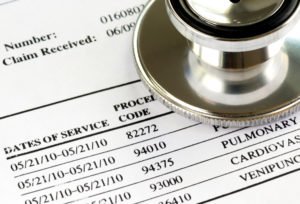
A medical lien is a way to pay for healthcare from your personal injury settlement or verdict, rather than paying for it up front. Some healthcare providers agree to get paid in a lien for their services, while others may not. If you pay for medical services on a lien, complications can arise later on in your case.
Medical liens
A medical lien, also known as a hospital lien, is an agreement between a patient who is to receive healthcare and the company that will provide it. In the agreement, the healthcare company agrees to provide healthcare without getting paid upfront. Instead, the provider agrees to take what they are owed from the patient’s personal injury settlement.
Basically, a medical lien is a way for you to receive healthcare on credit while your workers’ compensation or personal injury lawsuit moves forward.
Once your case ends in a settlement or verdict, the healthcare provider with the lien, also known as the lienholder, gets paid first. This repayment part of the lien process can lengthen the time it takes for you to get paid after the settlement.
Medical liens are common when you do not have the means to pay for the care that you need to treat a serious injury after an accident. Uninsured accident victims often use medical liens to get healthcare. They often face steep medical bills and pressure to pay them quickly. According to the National Safety Council:
For car accidents that caused evident injuries in 2022, the average economic cost per victim was $42,000. This increased to $162,000 for injuries that were disabling.[1]
A medical lien can be very useful for covering the portion of those losses from your medical bills, as your personal injury case may take years to resolve.
Many states also allow healthcare companies to put a medical lien on your personal property or assets, rather than the proceeds of your personal injury case. Some state laws prohibit these types of liens from being placed on your house.[2]
If you lose your personal injury case
A common complication in cases where medical liens have attached to the settlement is when the plaintiff loses their personal injury case. This can become a problem when either:
- there is no settlement or verdict in favor of the plaintiff at all, or
- the plaintiff wins some money, but not enough to satisfy the lien.
If this happens, you will still have to pay off the lien. The healthcare provider will send you the bills for it. If you cannot pay them, the healthcare provider can send the bills to collections to recover what it can.
If you recover some money in the settlement, but not enough to pay the lien, the lienholder will take the entire settlement and then seek the remaining lien amount from you. If the lien has also attached to your personal property, the lienholder can take that property to satisfy the debt.
The lien can be negotiated after a personal injury settlement
Medical liens are contracts. The lien agreement can be negotiated with your healthcare provider both before and after a personal injury settlement.
Negotiating a hospital lien is particularly common after you have received medical care but then did not recover enough in your case to satisfy the lien. The medical provider may be willing to accept less money in order to not have to pursue you in collections. They may also be willing to accept the money in a payment plan over time.
The personal injury lawyers at our law firm have found that medical institutions are far more likely to negotiate with you if you have legal representation.
How hospital liens can help your personal injury claim
Medical liens can be a solution to a practical problem that many injured victims face, and that defendants often use as leverage: Your need for medical care while the case progresses.
If you are paying out-of-pocket for your healthcare, defendants and their insurers often use the financial pressure that you are feeling to reduce their settlement offer. They hope that an injured person would be willing to accept less settlement money in order to pay the bills that are becoming due.
If you have private insurance or Medicaid
If you have private insurance or are on Medicaid or Medicare, you generally will not need a medical lien. Your insurer will cover your medical expenses. However, you can still use a medical lien to cover your out-of-pocket expenses, such as the payments you make before reaching your deductible.
If you are insured and do not use a medical lien, your personal injury settlement proceeds can still be affected. Rather than paying off the personal injury lien, though, your settlement can be subjected to subrogation.
Subrogation is when your health insurance company recoups what it has paid from your personal injury settlement. It can also happen if your auto insurance policy includes personal injury coverage.
Our personal injury attorneys have found that many injury victims are surprised when subrogation happens. However, if it did not happen, then you would receive a windfall. You would have gotten your medical treatment paid for by your insurer, and then been compensated for what your insurance company spent. Subrogation is how your insurance provider collects reimbursement for what it paid for your medical care.
Legal Citations:
[1] National Safety Council, “Guide to Calculating Costs.”
New York Senate Bill S6522A.

